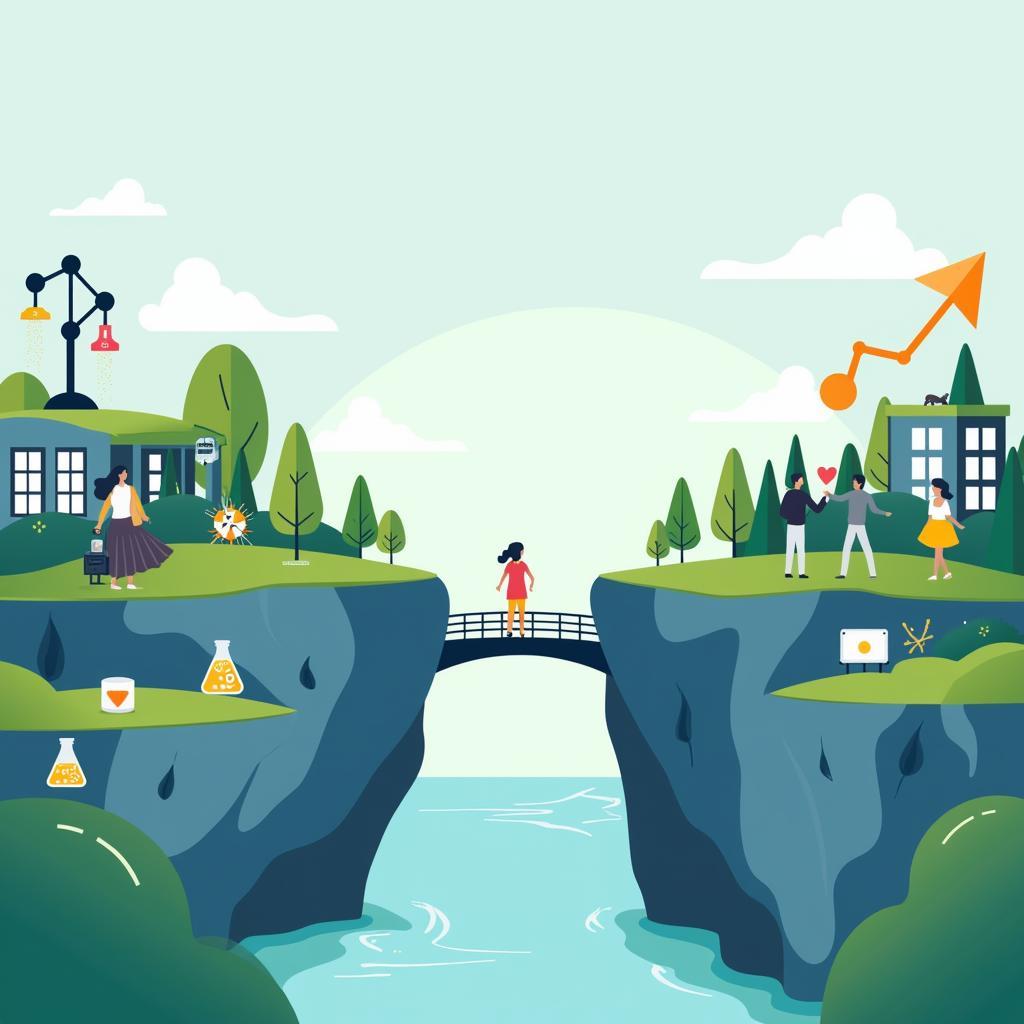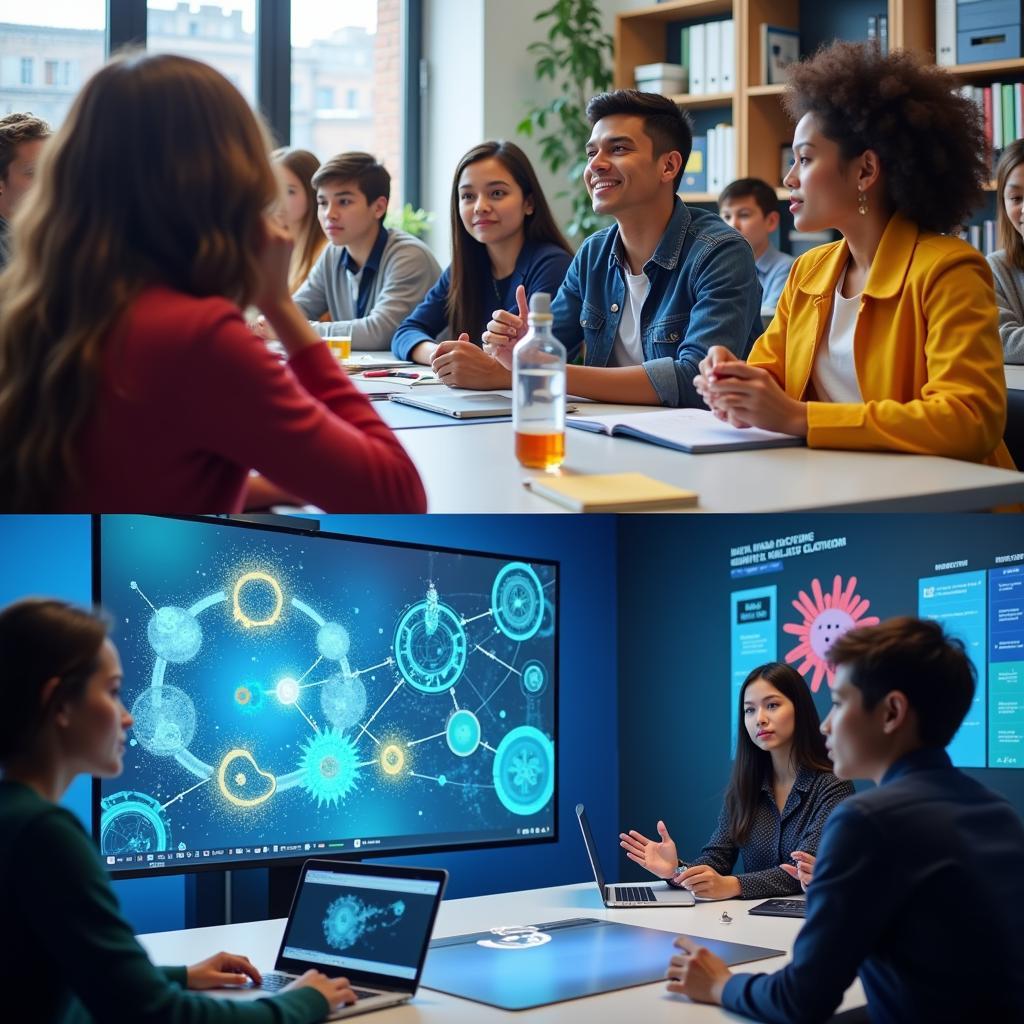Conversations At The Intersection Of Science And Society are increasingly critical in our rapidly evolving world. Within the first few decades of the 21st century, scientific advancements have reshaped our lives, from how we communicate to how we understand our place in the universe. These changes necessitate ongoing dialogue between scientists, policymakers, and the public to ensure these advancements serve humanity’s best interests. This discourse is not merely an academic exercise; it’s a crucial element in shaping a future where science and society coexist harmoniously.
How can we foster productive conversations at the intersection of science and society? Open communication is key. Scientists need to effectively communicate their research findings in an accessible way, while the public needs to engage with scientific information critically and thoughtfully. This requires building trust and mutual understanding.
Bridging the Gap: Fostering Understanding
One of the primary challenges in these conversations is the knowledge gap between scientific experts and the general public. Scientific jargon and complex concepts can be intimidating, hindering meaningful dialogue. Therefore, scientists have a responsibility to translate their work into plain language, using analogies and real-world examples to make complex ideas relatable.
 Bridging the Communication Gap Between Science and Society
Bridging the Communication Gap Between Science and Society
For example, explaining the complexities of genetic engineering can be made more accessible by comparing the process to editing a text document, highlighting how specific genes can be targeted and modified. This approach empowers individuals to participate in informed discussions about the ethical and societal implications of such technologies.
The Role of Education and Media
Educational institutions and media outlets play a crucial role in facilitating these conversations. Schools should prioritize science literacy, equipping students with the critical thinking skills necessary to evaluate scientific information. Similarly, media outlets should strive for accurate and unbiased reporting on scientific topics, avoiding sensationalism and presenting information in a balanced manner.
 Science Education and Media Dialogue
Science Education and Media Dialogue
Furthermore, platforms for public engagement, such as science cafes and online forums, can create spaces for direct interaction between scientists and the public. These interactions can help demystify science and build trust.
Addressing Ethical Dilemmas: Navigating Complexities
Conversations at the intersection of science and society are essential for navigating the ethical dilemmas that arise from scientific progress. For instance, advancements in artificial intelligence raise questions about job displacement, algorithmic bias, and the very definition of intelligence. Open dialogue is crucial for establishing ethical guidelines and regulations for these technologies.
“Ethical considerations must be central to any discussion about scientific advancement,” notes Dr. Emily Carter, a renowned ethicist specializing in emerging technologies. “We need to consider not only the potential benefits but also the potential risks and unintended consequences.”
federalist society dolly parton
What are the societal implications of genetic engineering?
Genetic engineering holds immense potential for treating diseases and improving human health. However, it also raises concerns about genetic discrimination, the creation of “designer babies,” and the potential for unforeseen ecological consequences. Society must grapple with these complex issues through open and inclusive discussions.
“Open dialogue is crucial for establishing ethical guidelines and regulations for these technologies,” adds Dr. Carter. “We need to ensure that these advancements benefit all of humanity, not just a select few.”
lucy family institute for data & society
Building a Shared Future: Collaborative Solutions
Ultimately, conversations at the intersection of science and society are about building a shared future. By fostering understanding, addressing ethical dilemmas, and engaging in collaborative problem-solving, we can harness the power of science to create a more just, equitable, and sustainable world. This requires a commitment to inclusivity, ensuring that all voices are heard and valued in the conversation.
In conclusion, conversations at the intersection of science and society are not optional; they are essential. By embracing open communication, promoting science literacy, and fostering ethical awareness, we can ensure that scientific progress serves the betterment of humanity and contributes to a more peaceful and prosperous future for all.
american nuclear society conference
FAQ
- Why are conversations between science and society important?
- How can scientists communicate their work more effectively to the public?
- What role does the media play in shaping public perception of science?
- What are some ethical considerations related to advancements in artificial intelligence?
- How can we ensure that scientific progress benefits all members of society?
- What are some examples of successful initiatives that bridge the gap between science and society?
- How can we encourage more young people to pursue careers in STEM fields?
Need support? Contact us 24/7: Phone: 02043854663, Email: [email protected], or visit us at Zone 34, Bac Giang, 260000, Vietnam.